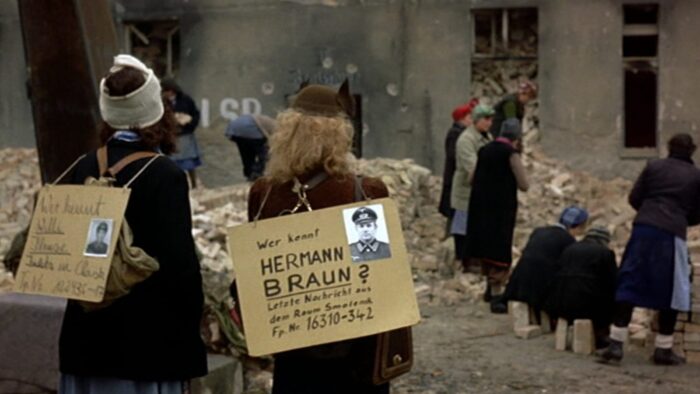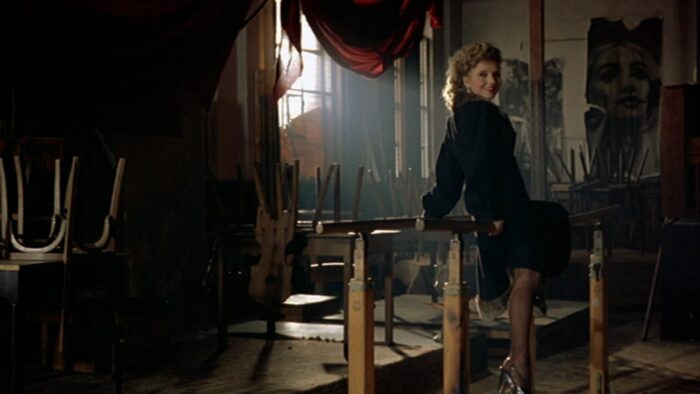
Well here I am, once again reviewing the first part of a loosely-defined trilogy from a director synonymous with the ’70s. The Marriage of Maria Braun is the first in Rainer Werner Fassbinder’s “BRD Trilogy” which is also a Criterion box set that traces three films by Fassbinder about Germany’s post-war period seen through the eyes of a female protagonist. I have not seen the other two films in this trilogy (1981’s Lola and 1982’s Veronika Voss) nor have I seen any other Fassbinder films since Ali: Fear Eats The Soul, my first foray into the German New Wave director several Criterion Months ago. After seeing The Marriage of Maria Braun, I would say I’m still curious to check out more of his massive body of work, though I’m not sure to what extent exactly.
While it has a melodrama bent to it, there is also an undercurrent of dark comedy running through The Marriage of Maria Braun, and nowhere is that more evident than its opening scene. In the midst of a chaotic allied bombing, two Germans, Maria (played by Hanna Schygulla) and Herrmann (Klaus Löwitsch), get married despite the bombs literally trying to tear their marriage apart as a priest attempts to complete their wedding ceremony while dodging explosions. Herrmann is about to head off to the front to fight in the Nazi army and Maria is relegated to living with her parents as they wait for the war to end while Maria hopes Herrmann will eventually come home. When her friend’s husband returns from the front, he gives her the bad news that Herrmann was killed.
This starts Maria on a strange and winding road toward her version of independence and prosperity. It begins when she starts working as a prostitute at a bar that a lot of American soldiers hang out, since at this point we’re in the period after World War II where Germany was occupied by the United States. Maria begins a relationship with an African-American soldier named Bill (George Byrd), whom she has a lot of affection for but is disinterested in marrying, since she’s still devoted to Herrmann. Things get very complicated when one day Maria and Bill are in the middle of foreplay and Herrmann appears in the doorway to see Maria and Bill naked. After Herrmann gets into a tussle with Bill, Maria smashes a bottle over Bill’s head and kills him.
Herrmann takes the fall for Bill’s death and is sentenced to prison time, which leaves Maria once again awaiting a return of sorts for her husband, and once again her eye wanders elsewhere. While Herrmann is in prison, Maria meets Karl Oswalt (Ivan Desny), a wealthy French businessman and she becomes his mistress before becoming his secretary. As the years go by, Maria becomes more involved in Karl’s business affairs, while Karl makes an agreement with Herrmann for him and Maria to inherit his money when he dies. After Herrmann is released from prison, he moves to Canada for a period and only returns once Karl dies, which leads to Maria and Herrmann finally living the life of domesticity they’d been waiting for all these years, though it doesn’t end up being quite what they expected.
The Marriage of Maria Braun was made during a pivotal moment in Fassbinder’s short but prolific career, where he had already directed over 20 films despite only being 32 years old. He had just released his first English language film, 1978’s Despair, which was his first film with a budget over a million dollars, but ended up being a bit of a flop. The Marriage of Maria Braun had a similarly bigger budget and wider scope, and perhaps because of this ended up being the crossover breakthrough that introduced him to a lot of filmgoers outside of Germany. I would say the scope of this story does lend it to some interesting themes, the kinds that could only develop over a number of turbulent years, but I feel like it also clashes tonally sometimes with Fassbinder’s more anarchic tendencies.
The most interesting aspect of The Marriage of Maria Braun is almost certainly getting to see what the post-war years in Germany were like. It’s a period that hasn’t been covered in a lot of movies (or at least that I’ve seen), I’m guessing because it’s so hard to make any characters that took part in Nazism sympathetic. I’m not sure that the movie ever makes Maria sympathetic, since she becomes increasingly ruthless in her desire to acquire wealth by any means necessary. But I think that because as a woman, she didn’t have to fight in that awful war, and because you see how destitute and ravaged the war left German civilians, you’re at least willing to see how she gets out of this mess that the war has caused for her personally.
I’m also not sure that we’re necessarily meant to sympathize with Maria because it seems that her life is a bit of a metaphor for post-war Germany. This is only something I kind of had a feeling about while watching the film, since I had a vague idea that Germany had a lot of economic growth in the decades after World War II. But I felt pretty smart seeing that this is a reading that many people have of the film, since after having little in the way of options, Maria turns to aligning herself with first an American and then a non-German man driven by money while also remaining faithful to a German. The film having her literally prostitute herself just to make a point about Germany’s rebirth is a little crass for my tastes, but I suppose it also makes sense in a movie about making the best of your dire circumstances.
After having seen just two of Fassbinder’s movies, I am starting to recognize some of his trademarks. With this and Ali: Fear Eats the Soul, it’s apparent that he’s interested in interracial relationships, but also has a skepticism toward conventional relationships and marriage generally, which isn’t all that surprising for a queer director. He’s also one of those directors who had a stable of actors that he worked with frequently, as the movie’s lead Hanna Schygulla is someone he’d been working with in the theater since the mid-’60s, even before he started directing movies. Whether I’ll get to know these various actors better in subsequent Criterion Months will remain to be seen, but with Fassbinder having 14 other films in the Collection, I’ve got plenty of options.


